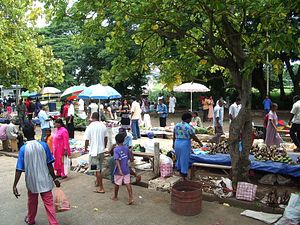At an event over the weekend to commemorate the ending of indentured labor in Fiji, former Prime Minister, Mahendra Chaudhry, expressed his belief that more should be done to acknowledge this reality of Fijian history. Between 1879 and 1916 the British transported over 60,000 Indians to Fiji to work on the islands’ sugar cane plantations. A significant population of Indo-Fijian subsequently grew from these initial laborers.
At the commemoration Chaudhry stated that “It is unfortunate that we don’t have the history, or political history, of the indentured system to inform the people about their significant contribution to the development of Fiji. It is not a subject in schools for students to know what our girmit [Indian indentured laborers] ancestors went through in the 41 years to help build this nation through their contribution.”
In 1999, Chaudhry achieved a milestone for the country in becoming Fiji’s first, and so far only, ethnic Indian prime minister. However, only one year after taking office Chaudhry and his cabinet were held hostage for 56 days in a coup launched by businessman George Speight. Speight framed his coup under the guise of ethnic Fijian nationalism, but it is suspected that the real motivation was that upon coming to power the Chaudhry government revoked contracts that had been awarded to two companies within the timber industry that were chaired by Speight.
A subsequent military coup, in 2000, was launched to resolve the situation, but Chaudhry was never returned to power. Although he remains the leader of the Labour Party, the party was unable to win any seats at the restoration of democracy in 2014 (after another military coup in 2006), with newer parties having gained political traction after the political upheavals.
While Speight’s attempted coup may have been self-serving, his promotion of ethnic Fijian nationalism was a tactic devised to gain greater traction than his own sour grapes. Fiji’s culture of coups has been motivated by actors who have either wished to establish reduced political rights for Indo-Fijians, or to establish equal rights for Indo-Fijians. The 2006 coup launched by Commodore Voreqe ‘Frank” Bainimarama sought to establish the latter. A new constitution created in 2013 prior to the restoration of democracy eliminated race-based electoral rolls, race-based seat quotes, the Parliament’s unelected upper house, and nullified the role of the hereditary Council of Chiefs. All changes designed to remove the structural privileges bestowed upon ethnic Fijians that existed in the country’s previous constitution.
Despite these constitutional changes to provide Indo-Fijians with equal status within the country, recent decades have seen a significant exodus of Indo-Fijians from Fiji. Prior to the 1987 coup that removed the multi-ethnic Labour Party from government, ethnic Indians accounted for around 50 percent of Fiji’s population. However, the continual political instability in Fiji, and a culturally embedded hostility towards Indo-Fijians has led to their emigration. As a result their percentage of the population has declined to around 32 percent, with most Indo-Fijians moving to Australia and New Zealand, as well as Canada and the United States.
While this demographic shift may please those ethnic Fijians who have resented the presence of Indo-Fijians in the country, those capable of emigrating to the West with ease are the country’s professional class. As a result, this population decline is also a significant draining of the country’s much needed skill-base, with medical professionals, teachers, engineers, and accountants being among the most prominent émigrés. Chaudhry commented on this phenomenon in 2005 claiming that “If the trend continues, Fiji will be left with a large pool of poorly educated, unskilled work force with disastrous consequences on our social and economic infrastructure and levels of investment.”
The use of indentured labor by the British to exploit the resources of their colonies remains one of the many unfortunate legacies of the European colonial period. Chaudhry’s belief that more should be done to recognize and understand this action should be an important element in making sure such systems of exploitation do not occur again in the future.
However, within this historical recognition should come an attempt for Fiji to come to terms with the reality of its ethnic makeup. Chaudhry’s suggestion that schools should learn about the history of Indian indentured labor in Fiji may be a step towards easing the ethnic tensions in the country, and helping it achieve greater political stability.
































